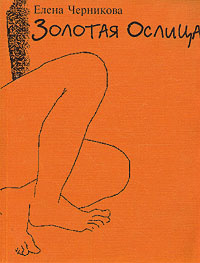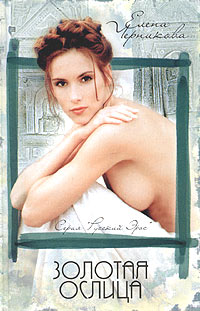|
<<Вернуться в раздел "Книги"
Zolotaia oslitsa

|
|
1997 г., издательство "Присцельс" |

|
|
2000 г., издательство АСТ |
Elena Chernikova
Zolotaia oslitsa
Moscow. ACT. 2000. 400 pages. 49 r
ISBN 5-17-000025-1
THE SUBTITLE OF Elena Chernikova's Zolotaia oslitsa
sounds intriguing: "Novel-Allusion About Love and Posthumous Life Written by a
Woman in Russia and Based on the Domesticated Russian Male Material." Defined as
an erotic novel, Zolotaia oslitsa (the title refers directly to Lucius Apuleius' classic,
The Golden Ass) covers the young, successful Lee's lifelong chain of love affairs and
relationships, from her first kiss as an eight-yearold yearold child to the last empathies
of her posthumous life. The narrative's eroticism seasoned with fantastic and
mysterious elements, the facility of the discourse, the episodic structure, and the
protagonist's physical transformation suggest the novel's Roman literary prototype.
The light eroticism, an important aspect of the novel, does not overshadow the
captivating analysis of the impact on the heroine's personality (ranging from subtle to
self-destructive) resulting from her every encounter with a man or boy (whether a
lover or not), as well as with women (particularly in the fragments where Lee exists in
the male body of Ghedat). Unlike Apuleius' work, Chernikova's novel focuses on her
protagonist's psychological and sensual metamorphoses, revealed through the
character's recollections and confessions. Additionally, Lee's fate is exposed by the
mysterious and disguised fellow traveler reading to her from an enigmatic book. And
though the physical journey is depicted as a latenight trolley-bus ride through the
Moscow winter (which is quite an exotic way of traveling for Lee, accustomed to her
husband's comfortable "car of a decent make and model"), the significance is ascribed
to the retrospective journey of the character's
recollections.
Contemporary Russian women's writing is
generally heavily impregnated with numerous tribulations and dramatic, if not tragic
conflicts, which reflect both the most recent societal changes evoked by glasnost' and
perestro?ka, and also other ingrained problems, descending almost from the Domosto?
period. Most prominent female writers such as Lyudmila Petrushevskaya, Tatiana
Tolstaya, Galina Shcherbakova, and Valeria Narbikova defiantly explore previously
taboo genderrelated topics, including sexual abuse, prostitution, unwanted
pregnancies, fictitious marriages, alcoholism, unattainability of self-fulfillment, or the
insoluble conflict between professional responsibilities and parental obligations. Their
hardboiled literary manner often demonstrates more explicit masculine qualities than
their male colleagues' writing. Chernikova's discourse, in contrast, is free of this
narrative or thematic toughness, although it is not free of conflicts, difficult or
controversial situations, and everyday problems. However, many of these are treated
ironically, where stable gender-related stereotypes and macho attitudes (the notorious
domesticated Russian male material"), widely proliferating in contemporary Russia,
are openly and wittily ridiculed. Although the novel broaches some important social
issues, they are presented in a subdued and allusive manner, primarily through the
prism of female sensuality and personal experience.
Such
an approach fully suits the generic requirements. Unfolding the complex sensuous
experiences of a contemporary woman on both the realistic and the fantastic levels,
Chernikova's fiction does not offer easy solutions. Her protagonist's journey, unlike
that of the adventurous and easygoing Lucius from The Golden Ass, is not concluded
in joy and happiness. The character's attempt to reevaluate love as a significant human
value, which can be interpreted in different ways, attests to this.
Generally, Chernikova's novel is dynamic, entertaining,
and easy to read. It is free of the didacticism and heavy-handedness typical of many
Russian and East European writers. Its major demerit lies in the loss of narrative
smoothness near the conclusion. The novel's closing
chapters
would benefit significantly from a simpler plot,
which currently incorporates features of several genres. Fantastic elements, social
satire, and dystopia, to say nothing of intertextual insertions, are interwoven into an
overly convoluted knot of strands, lines, and episodes which cannot be easily
untangled by the reader. Still, even in its less successful chapters, the book remains
provocative and thrilling. Representing an alternative female voice different from
mainstream Russian women's writing, Zolotaia oslitsa undoubtedly deserves to
betranslated into
English.
Tatiana
Nazarenko
University of
Manitoba
|
